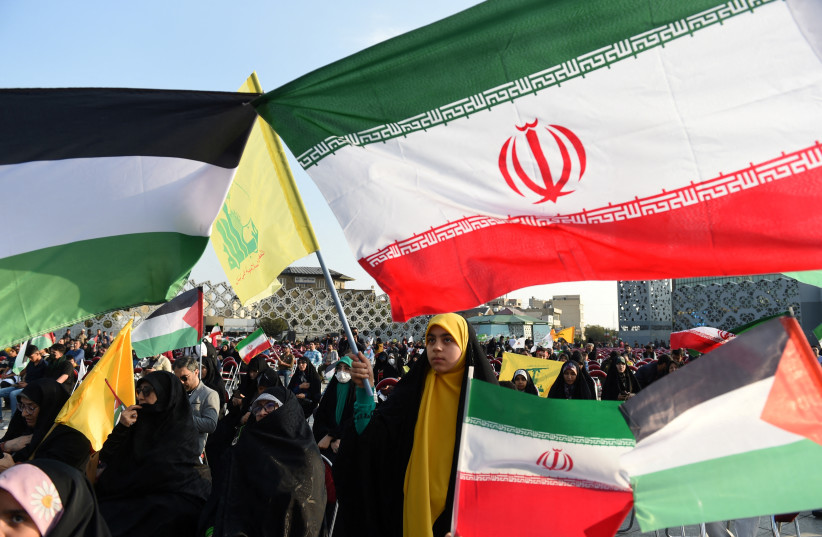Iranian Supreme Leader Ali Khamenei on Wednesday called for “de-Americanization’ of the Middle East, speaking to members of the Islamic Revolutionary Guard Corps Basij militia in Iran.
According to Iranian pro-regime media, he said that the current war in Gaza will lead to a negative outcome for the US role in the region. Iran has said that since the Hamas attack on October 7 the war between Israel and Hamas is actually a conflict between Iranian-backed groups and the US. Iran sought to expand the war against the US in Iraq and Syria, via its militias, and it has pushed anti-American messages in Turkey and other countries.
He called the Hamas attack on Israel a historic event and said that the result will be “de-Americanization,” meaning that the role of the US in the region will be overturned. He compared this to overturning a table or removing the US from the “table” of the Middle East. He also bashed western civilization. Fars News in Iran, which reported on the speech, said that “America’s plan to form a new Middle East failed completely.”
The Supreme Leader cited several examples. He said the US had failed in Lebanon, where Iran backs Hezbollah. “They said they want to give a new map to this region, which they named the Middle East. The new Middle East means a new political geography map,” the Iranian leader said. “They wanted to destroy Hezbollah. In their new plan, one part of the plan was to destroy Hezbollah. Hezbollah became 10 times stronger.”
Then he noted that the US sought to gobble up Iraq as well and he claimed the US sought to take over Syria using “proxies.” He accused the US of backing ISIS and Nusra, two extremist groups. The Nusra front, linked to Al-Qaeda, is now called HTS, and exists in Idlib, an area of Syria occupied by Turkey.

“One of the components of [the US plan for] this Middle East was to end the Palestinian issue in favor of the usurping regime [Israel],” Kahmenei said. However, the Iranian leader asserted that the region is now changing, and not in the US’s favor. According to Iran, the region, which it calls “West Asia” in contrast to the “Middle East,” is shifting. “What does de-Americanization mean? It means denying America’s dominance over the region,” the report notes.
Iran’s regime does not believe that countries in the region will sever relations with the US, but maintains that US “dominance” is now weakening every day. “Today, the policy and orientation in this region is de-Americanization. One of the clear signs that is in front of our eyes today is this storm of Aqsa [the Hamas attack on October 7]; Yes, this Al-Aqsa storm is against the Zionist regime, but it is de-Americanization.” The shift in the region’s support for the Palestinians is part of the “new map,” the Iranian leader said.
“It means the establishment of Palestinian sovereignty in all the land.” The Iranian leader concluded by saying he wants a “referendum” in Israel and the Palestinian areas.
What will the Middle East look like?
The Iranian leader also discussed other changes in the region. He mentioned how Iran is seeking to reduce sectarian Shia-Sunni tensions and also tensions between groups, such as “Arabs and non-Arabs.” Khamenei asserted that Shi’ites in Lebanon, i.e Hezbollah, have backed the Palestinians, who are Sunni.
The overall point of this speech was to take stock of the last 50 days of fighting in Gaza. Iran helped broker a deal with Thailand to enable Thai citizens who were taken hostage in Gaza to be released. Iran’s hand is also clear in other aspects of the current pause in fighting. Hezbollah has ceased its attacks for five days.
Groups in Iraq and Syria appear to be reducing tensions. Palestinian Islamic Jihad, which is backed by Iran and is seen as an Iranian proxy, also appeared on videos last night in Gaza during the hostage release, showing how Iran wants them to be more prominent in photos of the hostage deal.
The Iranian leader’s speech was covered in Iran pro-regime media and media linked to the IRGC, as well as in pro-Iranian Al-Mayadeen and also at the Kurdish channel Rudaw. This demonstrates the degree of its influence in the region and how all eyes are on Iran in terms of the next moves it may make.
